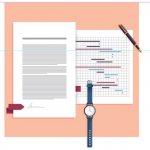Contracts, Clients & Deadlines
Low fees, under-resourced projects and difficult clients can have an enormous impact on the wellbeing of all within practice. The fourth section of the Architects Mental Wellbeing Toolkit tackles these important issues.

The issue of how architectural contracts and fees are agreed is complex, and can have a huge impact on the culture and the difficulties faced by many practices. Unfortunately, undercutting by competing practices often leads to fees that are not appropriate to resource a given project.
When practices take on projects without sufficient resources built into the fee, staff find themselves over-stretched, which can negatively impact mental wellbeing. Under-resourced fee bids should be avoided. On all projects it is important for project managers to understand and manage resources well, and to spot the signs that a project is under-resourced or a deadline might be missed.
Tips for practices
- Develop a strong working relationship with clients – without this it is much more difficult to negotiate on fees and deadlines.
- Agree a clear program, brief and responsibilities matrix, which can be used as a tool to negotiate deadlines and variation fees as projects progress.
- Develop an open dialogue with staff over resources, and promote transparency about program fees, budgets and timeframes. This can give a clearer picture of requirements and give team members a greater sense of autonomy and involvement.
- Ensure staff feel confident to speak up when they feel a deadline is unrealistic, or to make the case for more resources.
Tips for individuals
- Develop your time management skills and your understanding of how long a given task will take. It is a key skill for any architect and will help you to anticipate when a workload might be unrealistic.
- Voice your concerns if you are struggling with a deadline. It is better to speak up early so resources can be reviewed.
- Take up any opportunity to sit in on resourcing meetings or fee and variations discussions – you will learn to understand how the business operates.
- Build negotiation skills. Argue your case for sustainable fees that will allow you to resource your team appropriately.
Useful references
- Fees & Negotiation – The ACA has a suite of articles and advice around setting fees and negotiation tactics.
- ACA Time Cost Calculator Guide – A vital tool to help practices assess the time and costs involved in providing an appropriate level of service for a broad range of building types.
- The Best Fee Proposals Have These 10 Things In Common – Ian Motley, Blue Turtle Consulting.
- Is Regulation the Answer to Fee Madness? –Ceilidh Higgins, ACA.
- 15 Clients You Will Encounter as an Architect (And How To Deal With Them) – ArchDaily.
